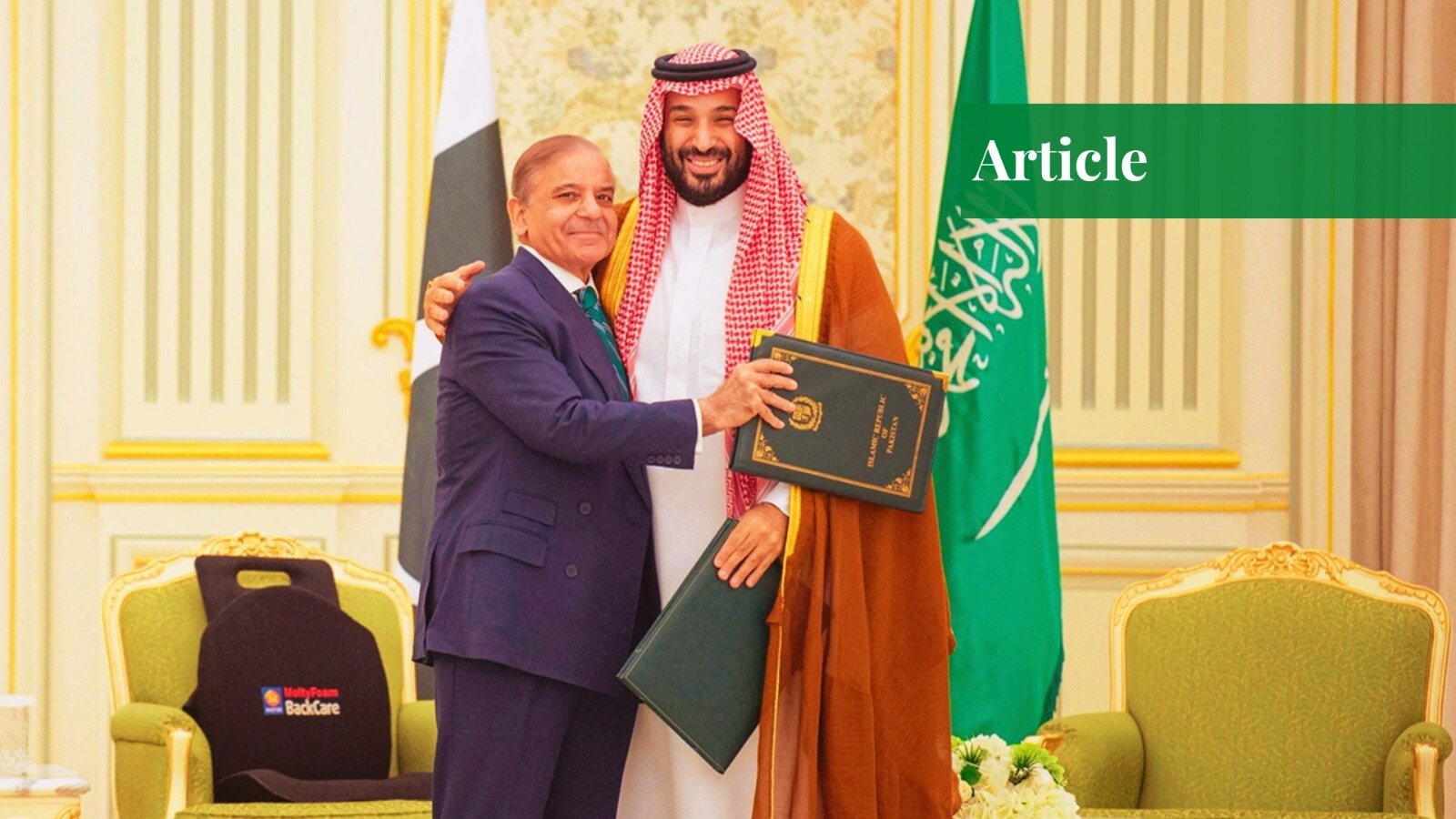Recent Shift of Saudi Military Dependency from the US to Pakistan
Pakistan and Saudi Arabia formalised the “Strategic Mutual Defence Agreement” during a high-profile meeting between Prime Minister Shehbaz Sharif and Crown Prince Muhammad bin Salman in Riyadh on September 17. Officials stated that talks between both nations for the Pak-Saudi agreement began months ago and are now finally announced. The timing is significant, as Israel recently attacked Qatar, which, like Saudi Arabia, is a key US ally. The US did not defend Qatar against Israel, leading to global speculation that it would not support Saudi Arabia in any potential conflict with Israel. Saudi Arabia, prioritising its security, signed the defence agreement with Pakistan.
Although full details remain undisclosed, one clause has gained global attention—similar to NATO’s Article 5, stating an attack on one nation would be regarded as an attack on both. Pakistan has a long history of security cooperation with Saudi Arabia, including deploying its military troops there. Additionally, Pakistan played a vital role in establishing the “Islamic Military Counter Terrorism Coalition,” with former Army Chief General Raheel Sharif serving as its military head.
How is the US Responsible for this Pact?
The Gulf countries, particularly Saudi Arabia, have an unwritten security agreement with the US, where the US consistently assured them of security support in case of escalation. Saudi Arabia has not pursued military deals with other nations, trusting America for its security. The Arab states believed they enjoyed unwavering US backing, especially after investing trillions in the US market following Donald Trump’s visit to the Middle East in May.
However, it is now evident that the US has an Israel-first policy in the region, prioritising its alliance with Israel over the economic interests of Arab nations. After US support for Israel during the Qatar attacks, Arab countries realised they could no longer fully rely on the US for security and are now considering other options, with Pakistan emerging as a leading choice due to its nuclear capabilities. Additionally, Pakistan promotes unity among Muslim countries and has a special affinity for Saudi Arabia because of Makkah and Madinah.
Global Concerns Related to this Agreement
Most of the details are not shared publicly, which raised concerns on the national and international levels.
Will Pakistan Provide Nuclear Support to Saudi Arabia?
It is the most common question being asked by everyone. The nuclear power of Pakistan is among the major reasons behind the Pak-Saudi defence agreement because Saudi Arabia can get conventional security guarantees from any other country, but signing a deal with Pakistan provides the nuclear umbrella to Saudi Arabia. The question of whether, in the case of an attack on Saudi Arabia, Pakistan will use its nuclear assets against that country or not is still unanswered.
Saudi Arabia’s Role in Any Possible India-Pakistan Escalation in the Future
India is the biggest trade partner of Saudi Arabia in the region. Both share a billion-dollar market in terms of imports, exports, and investments. That’s why neither country would want to start an open war with the other. It is believed that Saudi Arabia couldn’t support Pakistan openly against India, so it would help Pakistan indirectly through economic means. The detailed mechanism has not been decided yet.
Will Other Arab Countries Also Join SMDA?
Pakistan’s foreign minister, Ishaq Dar, recently discussed during a media briefing that some other Arab states are also interested in joining this defence agreement, but for now, we can not say anything because these dealings take time. The successful projection of this pact will compel other Arab countries to join this deal in the future. This is because the Gulf countries are economically stable, but militarily they lag, and Pakistan is the only country that would provide them a nuclear umbrella against Israel. In return, they will have to provide economic support to Pakistan.
Resemblance with NATO
Pakistan and Saudi Arabia have a long history of defence agreements, but this one is unique because it resembles Article 5 of NATO. According to some defence analysts, this agreement can become a Muslim version of NATO in the future.
Benefits for Pakistan
The main advantage for Pakistan is that it could establish its military bases closer to Israel. The two primary enemies of Pakistan worldwide are India and Israel. It is easier for Pakistan to keep an eye on India, but Israel is very far from Pakistan. Now, after the Pak-Saudi defence agreement, Pakistan can legally set up its military bases in Saudi Arabia. The distance between Israel and Saudi Arabia is only 1,284 kilometres, which would help the Pakistan Army to monitor Israel closely.
Additionally, millions of Pakistani workers are employed in Gulf countries. This agreement would enhance their living conditions. Pakistan faces economic instability and owes trillions in debt. Saudi Arabia would offer economic advantages to Pakistan through investments in the Pakistani market, boosting bilateral trade, and supplying oil at lower prices. It is also said that the Kingdom of Saudi Arabia aims to buy JF-17 Thunder from Pakistan. It would help Pakistan in achieving economic stability.
Conclusion
This significant move by Saudi Arabia highlights that survival and security are top priorities for any country in global politics. Saudi Arabia entered this deal because its survival was at risk. Undoubtedly, the US will respond to this agreement between two of its allied countries, and there is a possibility that Donald Trump might restrict military support to Saudi Arabia. However, this step became essential because it now concerns Saudi Arabia’s national interests.
Additionally, the Pakistani government must disclose all details of the agreement to Parliament and its citizens because, unlike Saudi Arabia, Pakistan is a democracy. In a few years, there will be a new government in Pakistan, so it is vital for the entire Parliament and all political parties to be aligned, ensuring that a future government change does not affect the agreement.
Pakistan must also ensure that its support to Saudi Arabia is limited to defence, not offensive actions against any country. Some analysts in Pakistan speculate that Islamabad might assist Riyadh against the Houthis in Yemen. The Pakistani government should reassure the public and Parliament that it will not provide military support to Saudi Arabia in its potential conflict with Yemen.
If you want to submit your articles and/or research papers, please visit the Submissions page.
To stay updated with the latest jobs, CSS news, internships, scholarships, and current affairs articles, join our Community Forum!
The views and opinions expressed in this article/paper are the author’s own and do not necessarily reflect the editorial position of Paradigm Shift.
Ms Jaweria Naseem is currently pursuing her Bachelor's in International Relations from International Islamic University, Islamabad.



